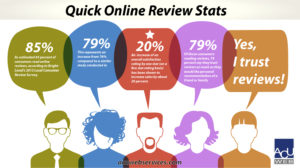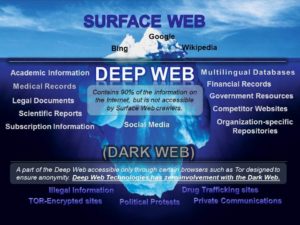Historically, word of mouth has been a powerful source for business referrals, and it still is today, but the Internet and online reviews has added a layer of information.
You should know that Bob will probably do some online research before reaching out to you– he’ll check out your website, read a few reviews and compare you to other potential like-kind companies.
Online reviews aren’t just for consumer products and restaurants anymore. These days, reviews are impacting revenue for all kinds of businesses and professional services including lawyers, roofers, loan officers, salons, boutiques, auto repair shops, rehab centers, doctors and everything in between.
What’s the big deal? We’ve uncovered the data, and the data tells us one thing– the power of online reviews shouldn’t be underestimated. Because reviews can hurt or help your bottom line, you need to know what people are saying about your business online.
With Jane’s recommendation and a few minutes spent online, Bob is able to form an opinion about you as a real estate agent before ever having met you. The majority of customers, like Bob, will read up to six reviews before forming an opinion of a business.
According to a Pew Research Center survey, as of January 2014, 87% of U.S. adults use the Internet and 58% of adults own smart phones. Worldwide, the United Nations reports 40% of the population is online. Who are the best bankruptcy lawyers in my area?
5 Reasons Online Reviews Matter for Your Business
1) 68% of consumers trust opinions posted online.
One of the most popular review websites, Yelp, has 207 million visits each month. Now factor in that customers are reading up to six reviews, both negative and positive, before ever having met you or stepped foot in your place of business. What is being said about your business should matter to you because it matters to everyone else.
I read it on the Internet, so it must be true.
2) 88% of consumers trust online reviews as much as personal recommendations.
That’s right; today, the vast majority of consumers trust the opinions of strangers on the Internet as much as their own friends. While an online review coming from an anonymous user, a review that lacks detailed information or one that doesn’t seem genuine won’t fall into this category, online reviews can be thoughtful, personal and thorough, much like an exchange between friends.
3) Customers are more likely to share bad experiences than good ones.
Sharing a bad customer experience online is an easy way to release frustration. Sometimes even more importantly, to a reviewer, is the idea that a bad review might save someone else from having a similar experience!
What we can take away from this fact is that it is important for you to proactively ask happy customers to leave online reviews too. Whether you helped Jane Doe buy her dream house or gave her the perfect haircut, let Jane know that you welcome and would appreciate if she could take the time to leave a review on your behalf. A bad review is bound to happen at some point, but wouldn’t it look nicer surrounded by a whole bunch of good ones?
4) You can turn a negative review into a positive review.
When a reviewer says something negative about your business, you have an opportunity to excel at customer service. Many review sites offer a reply feature. Often times after a business reaches out, reviewers will provide an update to their negative review and let people know what happened.
With the trust that your potential customers place in online sources, negative reviews have the potential to substantially impact your business. Reviews are influencing the opinions of potential customers, but they don’t have to be a permanent black mark on your digital record.
5) 72% of consumers say positive reviews make them trust businesses more.
Reading a bunch of negative reviews isn’t likely to make someone want to take a chance on a business. Reading a multitude of positive reviews provides a potential customer with a sense that the business can be trusted.
Summation
How do your online reviews tally up? Are people saying bad or good things about your business?
In short, people are forming opinions about your business based on what other people are saying, long before you even get the chance to meet them, so it’s your job to take an active interest and convert your online audience into new customers.
As the world exists today, you have to care about online reviews. Positive reviews can help bring in customers, negative reviews can turn people away and not having any online review presence can cause someone to feel like doing business with you would be a gamble.
People are looking for reviews and putting trust in those reviews, so it’s time to take a proactive role in the process– provide customer comment cards, send out surveys and ask happy customers to share a review. You may even consider providing a way for people to leave reviews on your own website so people won’t have to look any further to find glowing testimonials.
Now factor in that customers are reading up to six reviews, both negative and positive, before ever having met you or stepped foot in your place of business. What we can take away from this fact is that it is important for you to proactively ask happy customers to leave online reviews too.

Often times after a business reaches out, reviewers will provide an update to their negative review and let people know what happened. Reading a multitude of positive reviews provides a potential customer with a sense that the business can be trusted.
You need to know what people are saying about your business online because reviews can hurt or help your bottom line.
LocalAd Connection
1700 E.Sunrise Blvd Ste 1213
Ft Lauderdale, Florida 33304
Call Us Today: (USA) 1-954-266-0078
Call Us For More Info: (954) 266-0078
Copyright Disclaimer: Under Section 107 of the Copyright Act 1976, allowance is made for “fair use” for purposes such as criticism, comment, news reporting, teaching, scholarship, and research. Fair use is a use permitted by copyright statute that might otherwise be infringing. Non-profit, educational or personal use tips the balance in favor of fair use.

